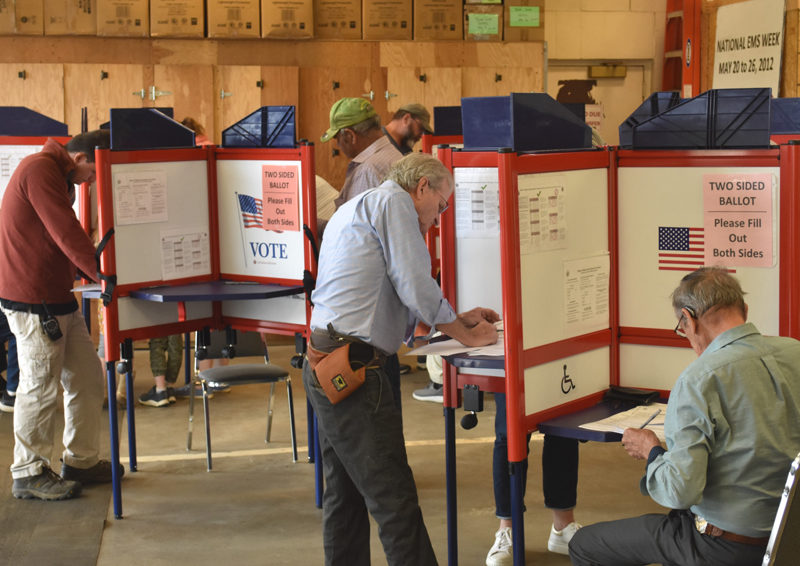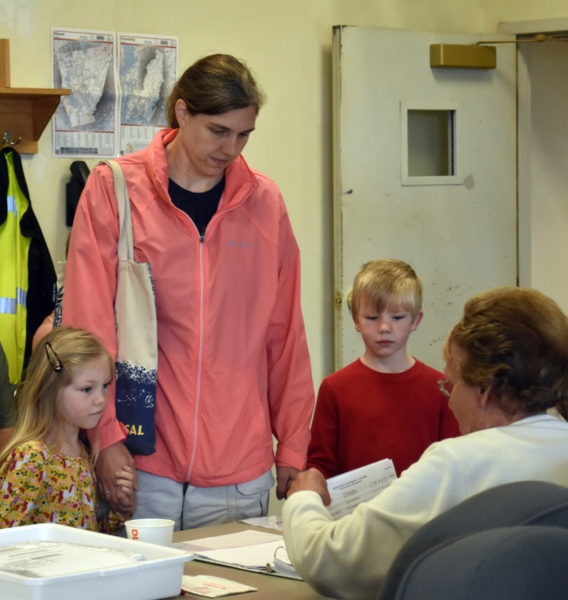
Waldoboro residents fill the fire station for the annual town meeting by referendum on Tuesday, June 13. (Elizabeth Walztoni photo)
Waldoboro voters approved a $6.85 million budget, the purchase of the town’s solar array, an aquaculture lease moratorium, and several ordinance amendments at annual town meeting by referendum on Tuesday, June 13.
The municipal budget as approved totals $6,857,917, an increase of $818,194 or 13.55%.
Increases in operating costs, contractual raises in pay and continued benefits for staff, and reserve fund contributions for future needs contributed to the budget figure, according to Town Manager Julie Keizer.
Public safety costs contribute to the rising budget, now totaling $3,169,825, an increase of $391,948 or 14.11%.
Much of that funds Waldoboro Emergency Medical Services, the Waldoboro Police Department, and the Waldoboro Fire Department.
The EMS and police departments have contractually obligated raises and benefits for their staff, and fire department volunteer stipends were increased in an effort to retain staff, Keizer said in May.
The public works department’s proposed budget is $1,215,068, an increase of $130,423 or 12.02%, due to contracts and rising material costs.
Public works services include road maintenance, park maintenance, winter plowing, sanding, and salting, and the operation of the Waldoboro

Melissa Butterfield checks in to vote at the Waldoboro fire station on Tuesday, June 13. (Elizabeth Walztoni photo)
Transfer Station.
Keizer said tipping fees, or the cost per ton to dump waste, have been a “huge driver” in the budget line this year. Hauling fees and fuel surcharges have raised costs even more.
In other cost increases, the transfer station budget totals $451,227, an increase of $158,623 or 54.21%. This number represents Waldoboro’s portion of operation cost, which is shared with the towns of Cushing and Friendship.
Cushing’s share is $136,424 and Friendship’s $102,404 this year, according to Keizer.
Increases to the capital reserve fund were also made for a number of department needs.
Voters also approved the town’s $164,000 purchase of a solar array owned by Sundog Solar on the town landfill, with its first half to be paid next February.
A six-month moratorium on aquaculture leases in Waldoboro’s coastal waters was approved as well. The moratorium was requested by the town’s shellfish committee earlier this year with concerns about the effect of these businesses on the Medomak River and its fishermen.
The moratorium’s six-month length would be used to prepare a permanent ordinance for the siting, development, and operation of state-issued aquaculture leases.
Ordinance revisions were enacted for a disorderly property ordinance approved by voters last year for properties with repeated behavioral complaints. The revisions define disorderly activities and establish a review committee, appeals board, and appeals process.
Revisions were also approved to the 2020 land use ordinance. Changes clarify sections in the ordinance, adjust the review process for change of use applications, and reduce the number of planning board members to preserve a quorum, among other adjustments.
Amendments to the town’s tax increment financing district expand the projects that funds can be used for and remove three parcels from the program that have dropped in value.
An amendment to the shellfish management ordinance introduces one-day recreational shellfish licenses.

Mark Stults laughs with voters as he mans the ballot box in Waldoboro on Tuesday, June 13. (Elizabeth Walztoni photo)



